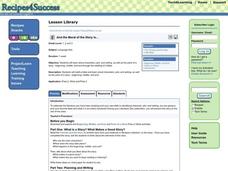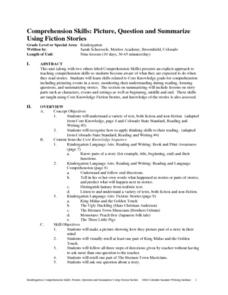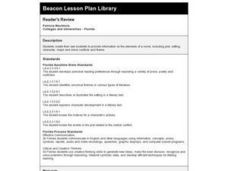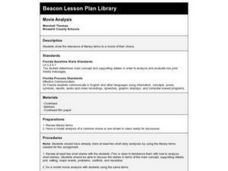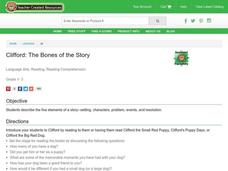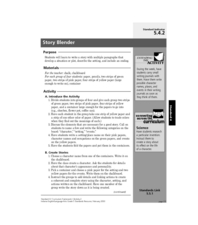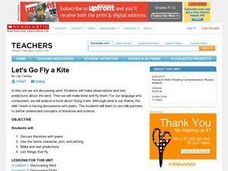Curated OER
Design a Book Cover
Learners use the programs Pics4Learning and ImageBlender 3 to apply their knowledge of characters, plot, setting, symbolism, and conflict to design and create a book cover. Designed as a culminating literature activity.
Curated OER
And the Moral of the Story is...
Students discover the parts of a story through the retelling of a fable as well as characters, plot, and setting. This lesson is completed using the program Pixie to create an online storybook.
Curated OER
Identifing Elements of Narrative Writing
Students explore the concepts of narrative writing. They identify the basic elements in narrative writing such as the setting description, characters, conflict, climax and resolution. Using five adjectives from a previous spelling unit,...
Curated OER
Round Robin Suspense
Pupils, in groups, write suspense stories. At the end of a timed period, they pass the story to the next student to continue it. At the last writing session, the papers are returned to the originators and they share the stories with the...
Curated OER
Information Problem Solving--Lesson 3 of 5
Students examine a selected story/book and practice identifying the setting, characterization, and plot. As a class, they identify problems in the story, turning points and the climax. They use a rubric to evaluate the story, as well.
Curated OER
Story Creation Magic: Character, Setting, Plot
Students review the terms plot, setting, and characters and examine how all of these elements are needed to make a story. They are given parts of stories and they try to identify all of those parts of the story.
Curated OER
Themes in Literature - Langston Hughes "Thank You Ma'm"
Eighth graders study Langston Hughes, "Thank You Ma'am" to discover the elements of plot, character motives and reactions. They express the effects of trust and kindness by writing a reflective personal narrative. They illustrate the...
Curated OER
Comprehension Skills: Picture, Question and Summarize Using Fiction Stories
Students build a variety of comprehension skills through the nine lessons of this unit. Picturing events, monitoring understanding during reading, forming questions, and summarizing stories form the core of the lessons being taught in...
Curated OER
Tempest in the Lunchroom
Students act out opening shipwreck scene of The Tempest, or watch and direct others doing it.
Curated OER
Five Parts That Contribute to the Whole
Students listen to and read an online story. Then they use a graphic organizer to learn the basic story elements. They select another online story and create a graphic organizer for its story elements.
Curated OER
Reading The Great Kapok Tree
Young scholars complete story frames to demonstrate understanding of plot development and conflict resolution.
Curated OER
Reader's Review
Students create booklets to provide information on elements of a novel, including plot, setting, character, major and minor conflicts and theme.
Curated OER
Movie Analysis
Fourth graders discuss main concept, supporting details, plot, setting, major events, problems, conflicts, and resolution in two short stories. They apply these terms to a movie of their choice. They compare analysis of movies to...
Curated OER
Break Down
Fourth graders apply their understanding of the elements of plot structure and conflict to cooperatively create storyboards and speak effectively as they present their products. They create storyboards for some of the classic Disney...
Curated OER
Introducing Mythology
Students look closely at a poster of a Rembrandt painting and/or a transparency of a Greek vase, both of which represent the mythological story of the abduction of Europa. Studnets consider how two artists interpreted the same subject in...
Curated OER
Creating a Comic Strip
Students examine various comic strips for their elements of humour, plot, drawing style, and basic design; they then create their own comic strip.
Curated OER
Egg Carton Stories
Students create stories with better structure when they are able to focus on its characters, setting, and plot. Teacher creates settings, character, and problem cartons with information written on strips of paper.
Curated OER
The Bones of the Story
Young scholars describe the five elements of a story--setting, characters, problem, events, and resolution. They use the Clifford series of books, and a worksheet imbedded in this lesson to help them explain the five elements of a story.
Curated OER
Story Blender
Fifth graders write a story with many paragraphs that include a plot, setting, and ending. In this writing lesson plan, 5th graders create stories as a class.
Curated OER
Sentence Pictures
In this matching sentences and pictures worksheet, students read the 7 sentences and then match them to the correct pictures.
Curated OER
Convolution Method
For this convolution method worksheet, students solve 4 different equations related to convolution methods. First, they create a combined plot of the three different solutions and the forcing function. Then, students use any method...
Curated OER
Second Order ODE's
In this second order ODE's worksheet, students solve 2 different problems that are related to determining the second order ODE's in each equation given. First, they set up an equation where the applied force is the cosine plus the sine...
Curated OER
Science: Let's Fly a Kite!
Students make observations about the wind and develop predictions to test with kites. The lesson's Language Arts component invloves communication of concepts with peers. On their kite flying day, students discuss how the wind and air...
Curated OER
The Librarian from Conneaut School
Second graders identify the elements of the story "The Librarian from the Black Lagoon." They listen to the story and list the story elements of character, settling, problem, and solution. They then use KidPix to create individual...



